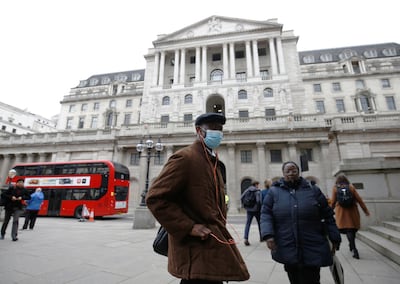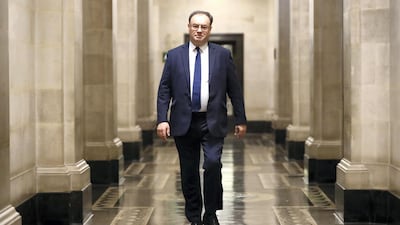Britain's economy is experiencing “lasting changes” as a consequence of the Covid-19 pandemic and the country's financial services industry must make a "major commitment" to support investment, according to Bank of England Governor Andrew Bailey.
Mr Bailey said the financial services industry must support the economy, businesses and the people of this country as the UK gets back on its feet and tries to address climate change.
"If these changes persist, they could require a reallocation of labour and capital, and this reallocation could be more or less costly,” Mr Bailey said in a speech to TheCityUk, a financial services industry group.
“None of us have good answers yet to how much these changes will persist, or even increase. But my best guess is that there will be lasting changes.”
Britain’s economy bounced back from recession in the third quarter of the year with record growth of 15.5 per cent, which still left the economy 9.7 per cent smaller than it was before Covid-19 struck.
The UK's return to growth in the three months ended September 30 came as movement restrictions eased following the first lockdown. Analysts warn that the economy is likely to shrink again in the fourth quarter of the year because of the effects of a second shutdown.
Mr Bailey said economic theory shows that heightened uncertainty about the future tends to have a negative effect on investment and “increases the attraction of waiting to see how the uncertainty is resolved”.
“Both Covid and the process of setting the future relationship with the EU have increased uncertainty ... and this has restrained investment, “he said.
Business expectations for sales next year remain subdued along with measures of investment intentions, he said, however, “encouraging news on the vaccine front … will play a major role in lowering the level of uncertainty,” as it may cause a reversal of a period of low productivity growth.
Looking back over the past couple of decades, Mr Bailey said business investment since the global financial crisis of 2008-09 has been weaker than in previous expansions, and investment growth has been unusually weak relative to employment.
In turn, Mr Bailey said the excess supply of saving globally relative to investment opportunity means that neural interest rates “will stay low for the foreseeable future”.

While the central bank chief has said in the past that negative interest rates are not imminent, the BoE has been assessing whether UK financial institutions can implement sub-zero rates without damaging their business, or whether such a move would backfire by depressing consumer confidence.
Former Bank of England Governor Mervyn King warned earlier this week that people would pull their money out of their accounts to stash it at home if interest rates are cut below zero.
However, Mr Bailey said on Tuesday that the “prevailing lack of uncertainty means” there is no room for the central bank to be complacent.
“You should expect a central bank to remain cautious,” he said.
On the issue of economic scarring from Covid, Mr Bailey said the consequences of structural changes will be less severe post-pandemic than they were in the 1980s and 1990s, when the country transitioned from heavy industry and mining to a more services oriented economy.
“That was a much more painful process, with very difficult consequences, including a sharp increase in economic inequality. I don’t believe that Covid will lead to the sort of inter-sectoral change that we saw in the 1980s and 90s. It is more likely to be a case of intra-sectoral change, for instance within services,” he said.
This is because the UK now has a labour market that has the capacity to adjust relatively quickly to such changes, he said.
While aggregate saving in the UK has gone up this year in line with a lack of opportunity to spend during the movement restrictions, Mr Bailey said investment is weak and there is no certainty “this higher saving level will persist”.
With Covid causing a major shock to companies, UK companies could face a cash flow deficit in the current financial year of up to around £200 billion ($264bn), as well as having to potentially refinance around £275bn of debt maturing over the coming year, according to the BoE’s August Financial Stability Report.
Mr Bailey said that authorities would keep an eye on risks from higher debt levels.
"While the current low level of interest rates supports the sustainability of UK corporate debt, higher leverage would make the corporate sector more vulnerable to interest rate or earnings shocks," he said.
Going forward, he said there is still a role for further monetary policy. The BoE injected a further £150 billion ($195bn) of stimulus into the UK economy earlier this month as it warned a second wave of the coronavirus pandemic will lead to a slower, bumpier recovery.
“As well as maintaining interest rates which are consistent with achieving the inflation target, in my view Quantitative Easing at a time like this can prevent an unwarranted tightening in financial conditions, such as the tightening we observed in late March this year,” he said.
“To be clear, that is not monetary financing or fiscal dominance. It is instead the support of private finance, via a well-functioning financial system, for the economy and thus for consumption and investment. Investment has to be financed.”


